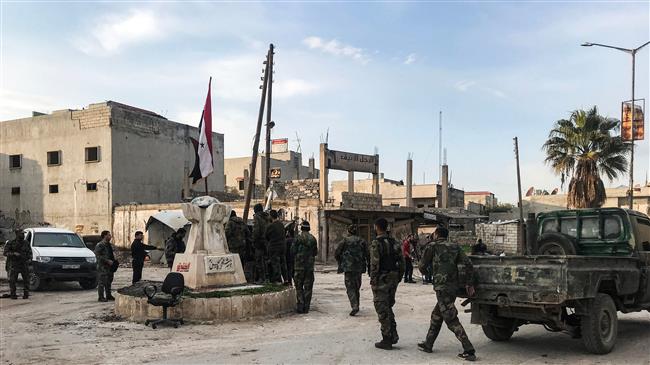
Syrian army soldiers gather with vehicles in a square in the town of Saraqib in the northwestern Idlib Province on March 6, 2020, as government forces wrested control over it. (Photo by AFP)
The government of Syrian President Basher al-Assad has managed to score a victory in the nine-year war with the support of Russia and Iran while Turkey is "pulled agonizingly" in several directions, says a former deputy director of the US spy agency CIA.
"Syriaís Assad has won - at least militarily, "John McLaughlin wrote in an article for the online platform OZY titled "SYRIA: IS THE END GAME APPROACHING?".
"Assad owes his survival to Russia and Iran, which brought significant ground and air forces to his rescue," he added.
The Syrian army has been fighting against a host of foreign-backed terrorist groups, which have been wreaking havoc on the country since 2011.
At the request of Damascus, Iran has been offering advisory military assistance to the Syrian government. Russia, too, has military advisers in the Arab state, besides carrying out aerial bombardments against the terrorist.
The Damascus government has managed to win back control of almost all regions from Takfiri elements in view of the Iranian and Russian support.
"Moscow emerges as the great power credited with standing by its ally and willing to put force and reputation on the line for Assad," McLaughlin wrote. "Russian President Vladimir Putin may now be the most influential foreign leader in the Middle East."
"Iran is entrenching itself in Syria - and plans to stay, he noted, saying that Tehran "sees Syria as anchoring a land bridge of influence from the Persian Gulf to the Mediterranean."
Syria has now been engaged in a liberation operation in Idlib Province, the last major bastion of the terrorists in the country.
The recent sweeping Syrian army gains, however, coincided with a massive deployment of troops and military equipment by Turkey, which is evidently upset by changing conditions on the ground.
"Idlib is the last piece of territory standing in the way of Syrian President Bashar al-Assad regaining control of the country. As a last refuge, Idlib has been a magnet for one of the most diverse populations on Earth, ranging from millions of innocent refugees to numerous fighting groups, the largest of which is an al-Qaeda offshoot, Hayat Tahrir al-Sham, and its 20,000 fighters", the ex-CIA official wrote.
"Probably no comparable piece of real estate on Earth is at this moment an active battleground closely engaging the interests of at least four major powers - Russia, Turkey, Iran and the United States," he pointed out.
Ankara backs militants fighting to topple the Damascus government. Those elements continue to target Syrian troops and allied Russian personnel.
In turn, the US has also been supporting anti-Damascus Kurdish militants and at the same time stealing Syriaís crude resources.
Analyzing the situation in Idlib, McLaughlin wrote that while Syrian government forces are advancing from the south, NATO member Turkey "is pushing back; Ankara claims it cannot absorb more refugees and has begun pointing those it already has toward the border with Greece and into Europe."
"Turkey is pulled agonizingly in multiple directions. It opposes Assadís advance but doesnít want to fight Russia, with which it tries to maintain good relations in hopes of influencing an eventual Syrian political settlement, particularly the future of the countryís Kurds," he added.
"Ankara sees Syriaís Kurds as allies of Kurds in Turkey, who are viewed as terrorists and separatists by Turkish leaders. Meanwhile, Turkeyís refusal to absorb more refugees strains its relations with Europe. And its harsh policy toward the Kurds has often put it at odds with the US, its chief NATO ally often closely partnered with the Kurds in Iraq and Syria."
Anti-American sentiment is currently running high in Syria as the US is maintaining its military presence there under the guise of fighting Daesh.
Earlier this month, a US military convoy had been forced to retreat from an area in Syriaís northeastern province of Hasakah after government forces blocked its way and groups of angry local residents threw stones at it.
"The United States, thanks to its hesitant policy during the [Barack] Obama administration and its erratic one under President Donald Trump, has forfeited most of its influence in Syria and over its future," McLaughlin wrote.
"With the US drawdown and the changing mission definition - now oddly one of protecting Syriaís negligible oil - Washington has left the region and Syriaís other players uncertain of its intentions and doubtful of its seriousness and staying power."
He concluded, "Strategically, the US has probably lost more than we can now realize... Syria was never a candidate for that kind of massive US intervention. What it needs and has lacked is, above all, constancy of purpose and clearly defined priorities - integrated with skillful diplomacy and a modest amount of force."
SOURCE: PRESS TV
LINK: https://www.ansarpress.com/english/14602
TAGS:






























 online news tv
online news tv




